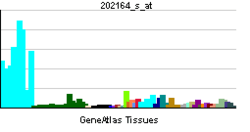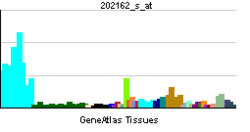CNOT8
CCR4-NOT transcription complex subunit 8 is a protein that in humans is encoded by the CNOT8 gene.[1][2][3]
Interactions
CNOT8 has been shown to interact with BTG2,[4] BTG1,[4][5] CNOT1[2][6] and CNOT3.[2]
References
- ↑ Fidler C, Wainscoat JS, Boultwood J (May 1999). "The human POP2 gene: identification, sequencing, and mapping to the critical region of the 5q- syndrome". Genomics 56 (1): 134–6. doi:10.1006/geno.1998.5687. PMID 10036195.
- ↑ 2.0 2.1 2.2 Albert TK, Lemaire M, van Berkum NL, Gentz R, Collart MA, Timmers HT (March 2000). "Isolation and characterization of human orthologs of yeast CCR4-NOT complex subunits". Nucleic Acids Res. 28 (3): 809–17. doi:10.1093/nar/28.3.809. PMC 102560. PMID 10637334.
- ↑ "Entrez Gene: CNOT8 CCR4-NOT transcription complex, subunit 8".
- ↑ 4.0 4.1 Prévôt D, Morel AP, Voeltzel T, Rostan MC, Rimokh R, Magaud JP et al. (March 2001). "Relationships of the antiproliferative proteins BTG1 and BTG2 with CAF1, the human homolog of a component of the yeast CCR4 transcriptional complex: involvement in estrogen receptor alpha signaling pathway". J. Biol. Chem. 276 (13): 9640–8. doi:10.1074/jbc.M008201200. PMID 11136725. Vancouver style error (help)
- ↑ Rual JF, Venkatesan K, Hao T, Hirozane-Kishikawa T, Dricot A, Li N et al. (October 2005). "Towards a proteome-scale map of the human protein-protein interaction network". Nature 437 (7062): 1173–8. doi:10.1038/nature04209. PMID 16189514.
- ↑ Ewing RM, Chu P, Elisma F, Li H, Taylor P, Climie S et al. (2007). "Large-scale mapping of human protein-protein interactions by mass spectrometry". Mol. Syst. Biol. 3 (1): 89. doi:10.1038/msb4100134. PMC 1847948. PMID 17353931.
Further reading
- Bogdan JA, Adams-Burton C, Pedicord DL, Sukovich DA, Benfield PA, Corjay MH et al. (1998). "Human carbon catabolite repressor protein (CCR4)-associative factor 1: cloning, expression and characterization of its interaction with the B-cell translocation protein BTG1". Biochem. J. 336 ( Pt 2) (Pt 2): 471–81. PMC 1219893. PMID 9820826.
- Hartley JL, Temple GF, Brasch MA (2000). "DNA cloning using in vitro site-specific recombination". Genome Res. 10 (11): 1788–95. doi:10.1101/gr.143000. PMC 310948. PMID 11076863.
- Prévôt D, Morel AP, Voeltzel T, Rostan MC, Rimokh R, Magaud JP et al. (2001). "Relationships of the antiproliferative proteins BTG1 and BTG2 with CAF1, the human homolog of a component of the yeast CCR4 transcriptional complex: involvement in estrogen receptor alpha signaling pathway". J. Biol. Chem. 276 (13): 9640–8. doi:10.1074/jbc.M008201200. PMID 11136725. Vancouver style error (help)
- Wiemann S, Weil B, Wellenreuther R, Gassenhuber J, Glassl S, Ansorge W et al. (2001). "Toward a catalog of human genes and proteins: sequencing and analysis of 500 novel complete protein coding human cDNAs". Genome Res. 11 (3): 422–35. doi:10.1101/gr.GR1547R. PMC 311072. PMID 11230166.
- Simpson JC, Wellenreuther R, Poustka A, Pepperkok R, Wiemann S (2000). "Systematic subcellular localization of novel proteins identified by large-scale cDNA sequencing". EMBO Rep. 1 (3): 287–92. doi:10.1093/embo-reports/kvd058. PMC 1083732. PMID 11256614.
- Morel AP, Sentis S, Bianchin C, Le Romancer M, Jonard L, Rostan MC et al. (2003). "BTG2 antiproliferative protein interacts with the human CCR4 complex existing in vivo in three cell-cycle-regulated forms". J. Cell. Sci. 116 (Pt 14): 2929–36. doi:10.1242/jcs.00480. PMID 12771185.
- Wiemann S, Arlt D, Huber W, Wellenreuther R, Schleeger S, Mehrle A et al. (2004). "From ORFeome to biology: a functional genomics pipeline". Genome Res. 14 (10B): 2136–44. doi:10.1101/gr.2576704. PMC 528930. PMID 15489336.
- Mehrle A, Rosenfelder H, Schupp I, del Val C, Arlt D, Hahne F et al. (2006). "The LIFEdb database in 2006". Nucleic Acids Res. 34 (Database issue): D415–8. doi:10.1093/nar/gkj139. PMC 1347501. PMID 16381901.
- Dorfleutner A, Bryan NB, Talbott SJ, Funya KN, Rellick SL, Reed JC et al. (2007). "Cellular pyrin domain-only protein 2 is a candidate regulator of inflammasome activation". Infect. Immun. 75 (3): 1484–92. doi:10.1128/IAI.01315-06. PMC 1828547. PMID 17178784.


